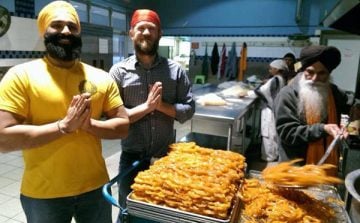April 19, 2016:  Langar is a word used to describe a communal kitchen in Sikh temples (gurdwaras), where food is served to all people regardless of religion, caste, beliefs, etc. In the 16th century in India, this was a very important distinction. To make this clear, people are supposed to sit on the ground, all at the same level (special exception is often made for people with disabilities and the elderly, some gurdwarey have tables with a disabled sign over them). It is basically a “soup kitchen” run by volunteers, by a religion. Any time a gurdwara is open a hot meal can be counted upon, pretty much.
Langar is a word used to describe a communal kitchen in Sikh temples (gurdwaras), where food is served to all people regardless of religion, caste, beliefs, etc. In the 16th century in India, this was a very important distinction. To make this clear, people are supposed to sit on the ground, all at the same level (special exception is often made for people with disabilities and the elderly, some gurdwarey have tables with a disabled sign over them). It is basically a “soup kitchen” run by volunteers, by a religion. Any time a gurdwara is open a hot meal can be counted upon, pretty much.
Langar is mostly vegetarian with few exceptions (nihangs sometimes serve meat called Mahaprashad on Hola Mohalla, for example). It is said that this is to allow all people to eat no matter what their personal needs. In today’s day an age, a plea for peanut-free or common-allergen-free langar could almost be made since seeing those items in langar does raise the question as to what someone with a severe allergy would do, however the basic point, when langar was started, was that Hindus didn’t eat beef, Muslims didn’t eat non-halal meat, and therefore being vegetarian, langar opened up the ability to those two main religious groups in India to eat.
Some other benefits of langar being vegetarian include a lower cost to supply it, less chance of spoilage (and thus food poisoning), and less attraction to animals who might be attracted to garbage leftovers outdoors (such as meat eating wolves).
The free kitchen, as langar is also known as, it is thought to have started with the first Sikh Guru, Guru Nanak Dev ji. However, it seems it was already popular in Chisti Sufis and the word is it was supposedly started by Baba Farid. Langar also expresses the ethics of sharing, inclusiveness, community, and oneness of all humankind.
The institution of Guru ka Langar has ensured that women and children have a place in the community, volunteering and rendering service to humanity. The word Langar comes from the Persian language meaning ‘an almshouse’, ‘an asylum for the poor and the destitute’.
Aside from the typical Langar halls in gurdwarey, Langar is also served often outside from tents during gurpurabs, nagar Kirtans, and other festivals. Some groups even cook up Langar and take it to areas of town where there are homeless people (instead of them coming to a gurdwara).
